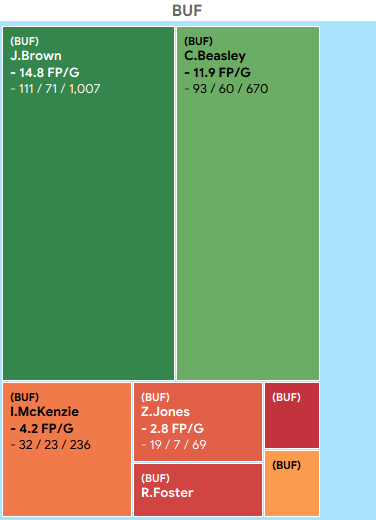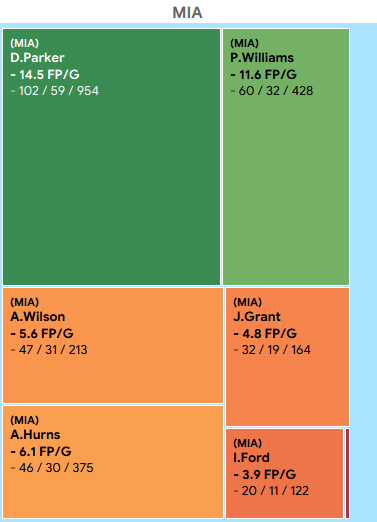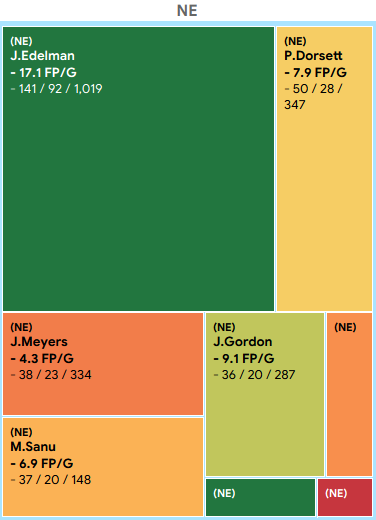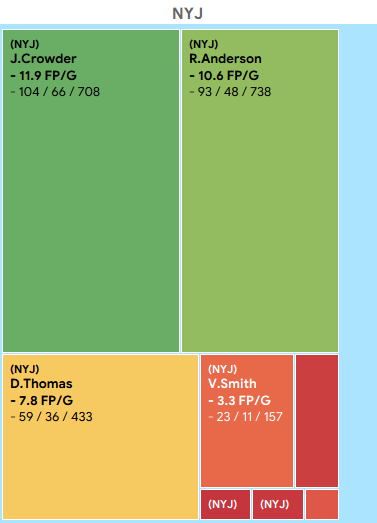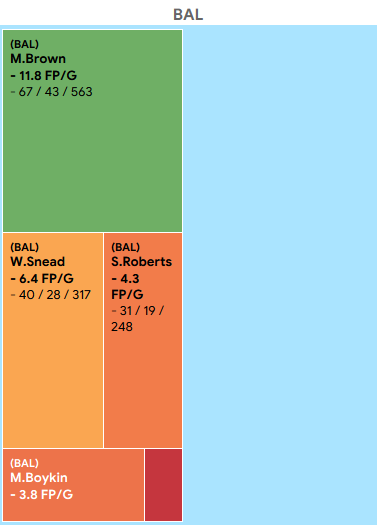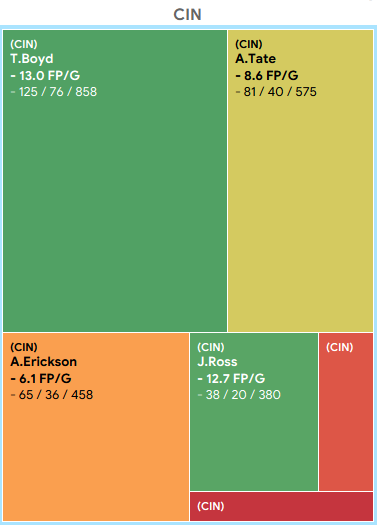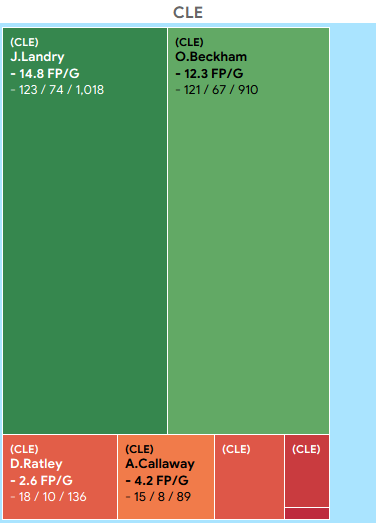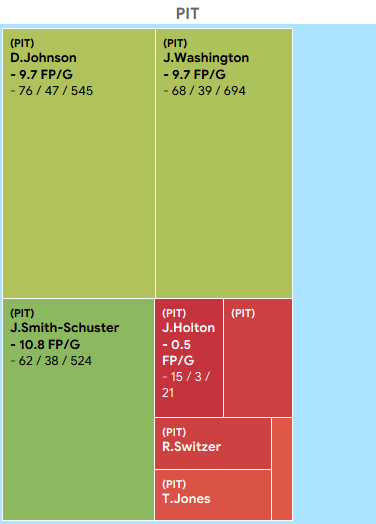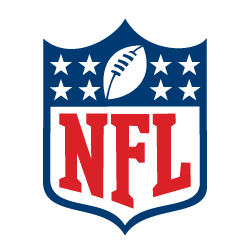Antonio Losada looks at last season's wide receiver usage and fantasy football impact for each of the 32 NFL teams. He tackles WR from both the AFC East and AFC North this time around.
Not every team splits up the targets in the passing game in the same way, and that has a great impact on the fantasy points any given player can get every week. Knowing who is getting used the most and who is getting the most of his opportunities in each offense is the key to acquiring the best possible fantasy football players.
In this series, I will be covering each of the eight NFL divisions, two at a time, presenting the teams and how they used their wide receivers in 2019. To present those teams and players I use a set of easy-to-read charts: treemaps. The graphics will hold all of the players of each team, the size of each box corresponding with the number of targets (percentage among teammates) he received during the season and the color related to the fantasy points per game (PPR-format leagues) he finished with at the end of the year. Also, the width of the full graphic represents how many total targets (combining those of every receiver) were thrown to receivers by the team compared to the rest of the teams in the division (the empty space in blue to the right, the fewer passes were thrown by such team).
Just to make things as clear as possible, I will add a little personal blurb on each team and how they performed in terms of WR usage and impact during the 2019 season. Let's break things down, this time covering the AFC East and AFC North eight teams!
Be sure to check all of our fantasy football rankings for 2025:- 2025 fantasy football rankings (redraft)
- Dynasty fantasy football rankings
- 2025 NFL rookie fantasy football rankings
- Best ball fantasy football rankings
- Quarterback fantasy football rankings
- Running back fantasy football rankings
- Wide receiver fantasy football rankings
- Tight end fantasy football rankings
AFC East: WR Target Share & Fantasy Impact
- Buffalo Bills
- All systems checked in Buffalo. John Brown became the clear WR1 with a healthy 39.4% target share and made the most of it providing 43.4% of the total Bills WR points.
- Beasley was the safety valve of QB Josh Allen, was used on 33% of the passes to WRs, and racked up 34.9% of the fantasy points.
- Miami Dolphins
- The Dolphins can thank Devante Parker for his breakout season. The wide receiver finished with 39.9% of the total points by the team's wide receivers and was close to averaging two fantasy points per target.
- Preston Williams was a nice surprise. He boasted a target rate of 19.5% and got 18.3% of the total fantasy points.
- Although Allen Hurns was used fewer times than Albert Wilson on more games, he produced 3.5% more fantasy points than the latter. Not a huge difference, but perhaps enough to see them flip roles next season.
- New England Patriots
- Talk about a one-man offense... Julian Edelman finished the year seeing 43% of the Patriots total targets and racking up 44.7% of the fantasy points at the position.
- Phillip Dorsett is a free agent, so Jakobi Meyers and his not-so-great 10.5% FP share should go all the way up or New England will have a rough time in 2020 when it comes to WR production.
- Mohamed Sanu, in the limited time he played for the Pats, was a bit of an afterthought but his role and production should increase next year.
- New York Jets
- Both Jamison Crowder and Robby Anderson were on par in terms of target share (34.9% to 31.2%) and fantasy points share (36.4% to 32.3%).
- Considering Anderson is a free agent and no other player other than Demaryius Thomas went for more than 8% of the team's fantasy points, New York should get itself some help at the position.
- Vyncint Smith was some sort of pleasant surprise, but on just 23 targets it's hard to judge how good he can be on a heavier role next season if he gets it.
AFC North: WR Target Share & Fantasy Impact
- Baltimore Ravens
- Now that you have stopped laughing at this chart, let's talk about it a bit. Yes, Baltimore threw the fewest passes to wide receivers (162) followed by Oakland (178), yet their WRs averaged 2.11 fantasy points per target (second-highest mark only behind Minnesota).
- Marquise Brown entered the league and exploited it big time. He was thrown 41.4% of the passes and got the exact same percentage of the team's fantasy points.
- The rest of the WRs did a bunch of nothing, so this is a bit worry for the Ravens.
- Only Willie Snead racked up more than 17% of points for the team at 26.4%, so reinforcing the pass-catching corps should be an offseason priority in Baltimore.
- Cincinnati Bengals
- With AJ Green out for the year it was all about Tyler Boyd for the Bengals. He had a team-leading 37.3% target share and got Cincinnati 38.8% of their points from the position.
- Auden Tate stepped up and although he didn't have a world-breaking production he still finished second in fantasy points share (22%).
- John Ross was the second-best player of the team in FP/G but on just six games played... we'll see if he can stay healthy next season.
- Cleveland Browns
- While Jarvis Landry totally out-performed Odell Beckham Jr. (46.8% point share to 38.9%) their target shares were as close as they could have been (Landry's 41.7% to OBJ's 41%).
- Cleveland should have trusted Landry more and that -- at least on paper -- should have given them better overall results by season's end.
- Other than those two, though, let's hope the Browns know how to pray.
- Pittsburgh Steelers
- Weirdest of weird seasons in Pittsburgh.
- Three players finished within six percentage points in target share and fantasy points share. That is basically unheard of in the whole league.
- JuJu Smith-Schuster was the best of the three, but he only played in 10 games and that bumped down his shares. Expect him to bounce back next season.
- Of the other two, Diontae Johnson should remain as the WR2 with James Washington slotting in at WR3 given their per-game production and shares.

 RADIO
RADIO








